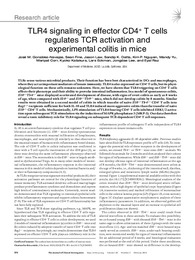Title:
TLR4 signaling in effector CD4+ T cells regulates TCR activation and experimental colitis in mice |
Authors:
González Navajas, José Manuel
Fine, Sean 
Law, Jason
Datta, Sandip 
Nguyen, Kim P.
Yu, Mandy 
Corr, Maripat
Katakura, Kyoko 
Eckman, Lars
Lee, Jongdae 
Raz, Eyal  |
Editor:
American Society for Clinical Investigation |
Department:
Departamentos de la UMH::Farmacología, Pediatría y Química Orgánica |
Issue Date:
2010-02 |
URI:
https://hdl.handle.net/11000/35483 |
Abstract:
TLRs sense various microbial products. Their function has been best characterized in DCs and macrophages, where they act as important mediators of innate immunity. TLR4 is also expressed on CD4+ T cells, but its physiological function on these cells remains unknown. Here, we have shown that TLR4 triggering on CD4+ T cells affects their phenotype and their ability to provoke intestinal inflammation. In a model of spontaneous colitis, Il10-/-Tlr4-/- mice displayed accelerated development of disease, with signs of overt colitis as early as 8 weeks of age, when compared with Il10-/- and Il10-/-Tlr9-/- mice, which did not develop colitis by 8 months. Similar results were obtained in a second model of colitis in which transfer of naive Il10-/-Tlr4-/- CD4+ T cells into Rag1-/- recipients sufficient for both IL-10 and TLR4 induced more aggressive colitis than the transfer of naive Il10-/- CD4+ T cells. Mechanistically, LPS stimulation of TLR4-bearing CD4+ T cells inhibited ERK1/2 activation upon subsequent TCR stimulation via the induction of MAPK phosphatase 3 (MKP-3). Our data therefore reveal a tonic inhibitory role for TLR4 signaling on subsequent TCR-dependent CD4+ T cell responses.
|
Type of document:
info:eu-repo/semantics/article |
Access rights:
info:eu-repo/semantics/openAccess
Attribution-NonCommercial-NoDerivatives 4.0 Internacional |
DOI:
10.1172/JCI40055 |
Published in:
J Clin Invest. 2010;120(2):570–581 |
Appears in Collections:
Artículos - Farmacología, Pediatría y Química Orgánica
|

.png)
